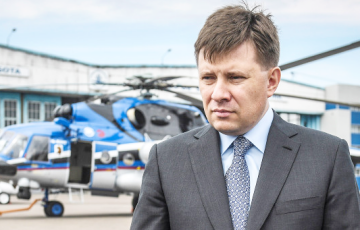CEOs Of Russia's Two Targest Aircraft Plants Were Fired
5- 25.11.2024, 13:44
- 7,860

Photo: Kirill Kukhmar / TASS
Due to the failure of the civil aviation program.
Russian authorities are launching a "purge" of top managers in the aviation industry, which has failed the Kremlin's plan to build domestic civil aircraft to replace Western ones.
On Monday, the United Aircraft Corporation announced the resignations of two directors of the largest aircraft factories at once, from which the authorities expected an increase in the production of airliners to levels that are record-breaking since Soviet times.
The CEO of JSC Yakovlev Corporation Andrey Boginsky and the Managing Director of PJSC Tupolev Konstantin Timofeev are leaving their positions. Yakovlev, which is engaged in the production of Sukhoi Superjet airliners, will now be personally headed by CEO Vadim Badekha, and the management of PJSC Tupolev has been entrusted to the deputy CEO of the company for state defence procurement Aleksandr Bobryshev. The reshuffle is related to the need for “timely certification and launch of serial production of a line of domestic civil airliners,” the UAC press service told Kommersant.
A Kommersant source in the aviation industry said that Boginsky was fired on the orders of Prime Minister Mikhail Mishustin “for the failure of the civil aviation program.”
The ambitious plan that the government prepared, promising to recreate the domestic aviation industry in the shortest possible time, assumed that 40 civil airliners would be produced in Russia this year. By 2026, production volumes were to be increased to 120 aircraft per year, by 2028 — to 200, and in 2030 to reach the level of 230 airliners annually, which would be the maximum since the second half of the 1970s.
According to the program, last year Russian carriers were supposed to receive two import-substituting Sukhoi Superjets and three Tu-214 airliners, and this year - 20 aircraft of the first type, seven of the second, and in addition 6 regional airliners MC-21 and two turboprop Il-114-300. In reality, the Russian aviation industry was able to produce two Tu-214 and one Il-96-300. And the government decided to radically cut the program. In 2025, instead of the originally planned 82 aircraft, only 20 aircraft are now expected to be produced. The plan for 2026 has been reduced from 120 airliners to 97, for 2027 - from 180 to 140.
First Deputy Prime Minister of the Russian Federation Denis Manturov warned in September that the program could be revised again next year. "Then we will understand more precise parameters, based on the fact that we will be approaching the completion of all certification procedures, and we will finally understand what quantity, in what years, which airlines will receive them," Manturov said.
Aircraft factories have little time: hundreds of foreign airliners that were purchased and leased by domestic carriers were left without maintenance and repair due to sanctions that prohibited the supply of aircraft components to Russia. The mass "retirement" of the civil aviation fleet will begin in 2025, Rostec CEO Sergei Chemezov warned earlier. Of the 736 aircraft, mainly Boeing and Airbus, about half may stop flying by 2026, experts at Oliver Wyman predicted.
Due to the threat of an aircraft shortage, Russian authorities have turned to Kazakhstan for help, offering it to participate in organizing domestic flights. According to Transport Minister Roman Starovoit, other "friendly" countries may also receive permission for cabotage transportation.











